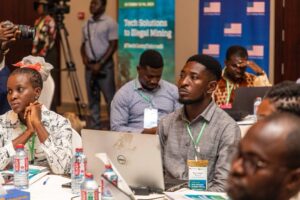Public Diplomacy Officer at the United States Embassy in Accra, Kevin Brosnahan, has said failure to effectively address the prevailing challenge of illegal mining risks making the country a net importer of water, and the environment becoming unfit for agricultural use.
Illegal mining activities, which often involve environmentally damaging practices, have already led to the pollution of many water-bodies across the country and land degradation – with environmentalists blaming successive governments for lacking the courage to bring this destructive activity to an end.
Mr. Brosnahan fears that against this backdrop, without immediate steps to arrest the situation, it will be difficult for the country to sustain its agricultural needs and maintain a healthy environment.
The Press Attaché of the US Embassy in Ghana spoke at the opening session of the ‘Tech Camp Takoradi’, a three-day workshop aimed at finding solutions to illegal mining, and also acknowledged the difficulty in solving this situation.
“Finding a long-term, sustainable solution will require innovative ideas. It will require contributions from national and local governments. Mining companies and associations must be part of the solution. And the ingenuity must come from NGOs, academics, entrepreneurs, innovators and local communities,” he said.

“That is why we have gathered 50 Ghanaian participants from diverse fields for this Tech Camp. You represent the public and private sectors in mining, minerals, water resources and public health. You come from environmental organisations, academia and the media. Look around you. Introduce yourselves. You are the answer,” he stated.
He noted that the United States government is committed to strengthening the country’s efforts to support sustainable small-scale mining, and to address the environmental impacts of large and small-scale mining activities.
Tech Camp Takoradi was organised by the U.S. Department of State, U.S. Embassy in Ghana andthe University of Mining and Technology (UMaT), Tarkwa. It brought together mining stakeholders from across the country to brainstorm on tech-enabled solutions to illegal mining.
Participants included representatives of mining communities and companies, scientists and innovators, policymakers, environmental activists, public health actors and the media. Together with U.S. and African experts and stakeholders on tech-based solutions, they aim to mitigate the negative environmental and health effects from illegal mining in the country.
“Illegal mining is one of the most challenging and serious threats to Ghana’s environment. We are pleased to bring international technology experts to help Ghanaian stakeholders find a sustainable path forward; one that supports mining communities while protecting the environment,” Mr. Brosnahan added.
The U.S. Embassy in Ghana has also supported numerous projects aimed at reducing mercury pollution. “We work with regional development partners to promote mercury-free gold production. We provide funding to pilot mercury-free processing technologies. We educate miners about business incentives for responsibly sourced gold in Ghana.”
Furthermore, he said, the embassy has sponsored capacity-building for law enforcement personnel to crack down on transnational criminal networks in the sector. “We empower journalists to report on nature-crimes such as illegal mining, illegal fishing and wildlife trafficking. We have also supported improvements to labour protection for miners and reducing the prevalence of child labour in mining.”
With technology experts from across Africa and the United States, participants at the TechCamp are expected to analyse the public policy aspects of illegal mining and devise possible solutions using the latest technologies – including artificial intelligence, remote sensing, geographic information systems, satellite data and tools made available through projects like SERVIR-West Africa, a joint initiative of the U.S. Agency for International Development and NASA.
Illegal small-scale mining remains a major contributor to deforestation, pollution of water-bodies, air and soil – and destruction of farmlands.
It has also contributed to serious health challenges and an increased number of school drop-outs in mining communities, posing challenges to sustainable development. Although it affects all Ghanaians, there is no widespread consensus on how best to tackle the issue.
U.S.-funded TechCamp workshops in countries around the world connect participants with technology experts to co-create innovative tech solutions for real-world challenges.










